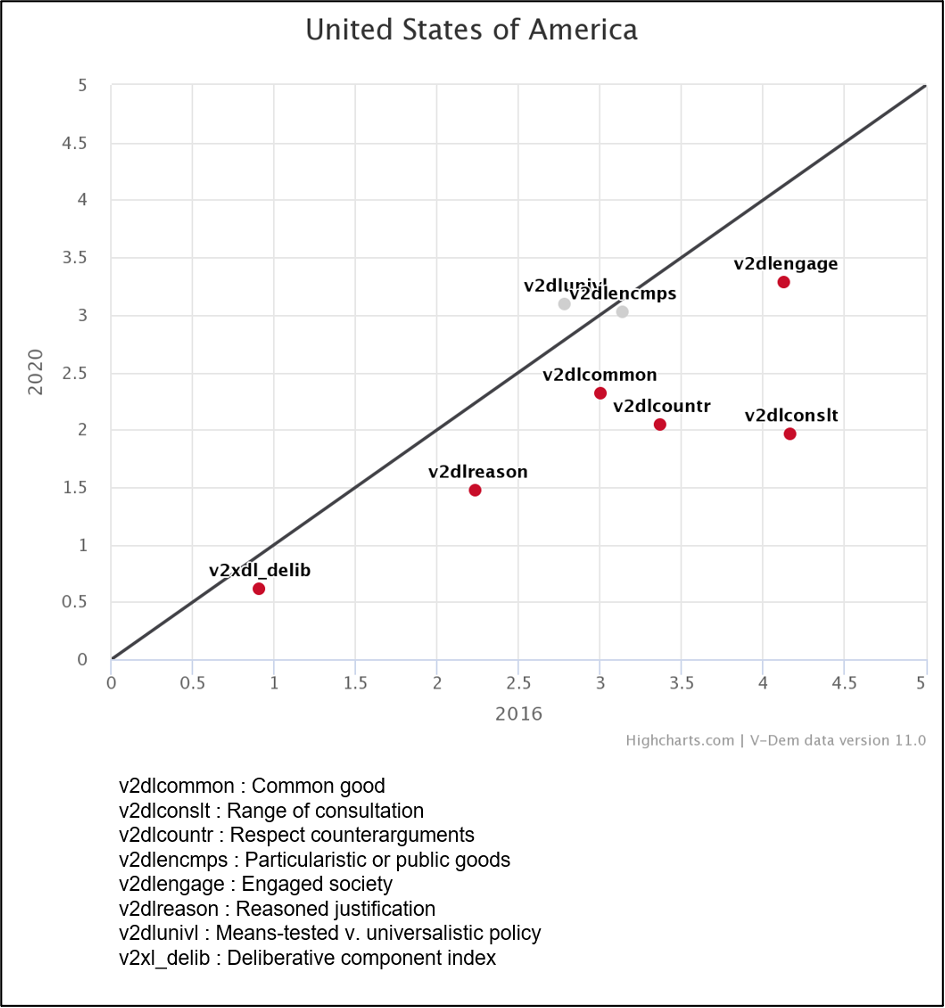Deliberation Suffered under Trump Presidency
By: Rowan Cole
May 04, 2021
Deliberation captures the way public speech is used by political leaders. From 2016 when Donald Trump secured victory in the presidential election, deliberation in the United States suffered a downturn. The graph shows deliberation indicators labelled with their names, as featured in the V-Dem codebook. In 2020, U.S. scores for “Range of Consultation” (v2dlconslt) and “Respect for counterarguments” (v2dlcountr) had declined most dramatically in a political landscape polarized by Trump’s leadership. Covid-19 saw Trump continue to dismiss counterarguments and challenges to his policies as a mere “hoax” in a similar vein to his “fake news” narrative from earlier in the administration.
The “Range of Consultation” (v2dlconslt) indicator captures how broad political consultation is at the elite level. It is scored from 0-5, with higher values indicating a greater diversity of opinion between different party positions, sectors, and demographics. Lower values, however, indicate consultation is limited to groups mostly loyal to the government. From 2016 to 2020 during the Trump presidency, this value fell from 4.17 to 1.96. Contrary to normal post-inauguration conduct, Trump did not attempt to unify the USA after he entered the White House and instead targeted policies that would be popular with his conservative support base. The failure to consult non-supportive constituencies in America is characteristic of populism that prioritizes the concerns of its support base.
“Respect counterarguments” (v2dlcountr) asks to what extent political elites acknowledge and respect counterarguments when considering important policy changes. This indicator is also scored from 0-5, with higher values indicating a greater level of respect and consideration for counterarguments. Although a creeping divergence between Democrats and Republicans has been visible over the last 30 years, Trump accelerated polarization by pitting his base against Washington and urban elites. In 2016, the American value for Respect counterarguments stood at 3.37 but had fallen to 2.05 by 2020.
Trump’s focus on appealing to his voter base corresponded with a decline in the respect for counterarguments when considering policy changes. An example early in the administration was the “Travel ban” that banned arrivals from six majority-Muslim countries to the USA (January 2017). Despite outcry from Democrats and many international charities that culminated in legal challenges, the administration doubled down on the ban. Eventually, a third version of the Travel Ban was upheld in June 2018 by the Supreme Court. Later, in 2019, President Trump responded to four Democrat congresswomen’s counterarguments to his child separation immigration policy with racist attacks.
These particularly dramatic trends of a decreased range of consultation and lack of respect for counterarguments likely contributed to the U.S.’ decline in overall levels of deliberation in V-Dem’s measures. This trend was continued in 2020, in the context of the Coronavirus (Covid-19) pandemic. In February 2020, Trump called criticism of his administration’s policy reaction to the pandemic a “hoax” and placed many of his political rivals’ counterarguments in the same category. The return to a more conventional presidency, with Joe Biden assuming office in 2021, is likely to see some of this decline reversed.


